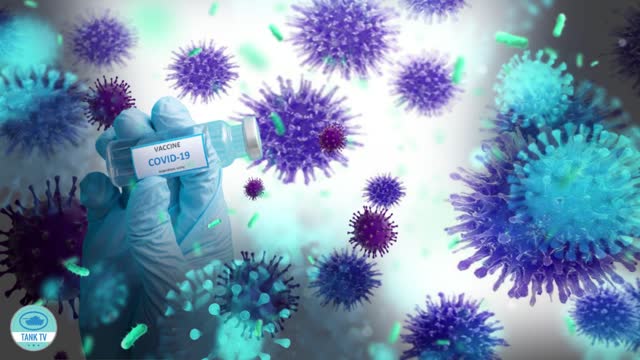Premium Only Content

COVID-19 threatens the entire nervous system
COVID-19 threatens the entire nervous system.
Summary: Roughly 50% of patients hospitalized for COVID-19 experience neurological symptoms including headaches, dizziness, smell and taste disorders, and stroke, a new study reports. Coronavirus may affect the entire nervous system, including the brain, spinal cord, and muscles. Neurological symptoms of COVID-19 may appear before the fever and cough commonly associated with infection.
Source: Northwestern University
A new review of neurological symptoms of COVID-19 patients in current scientific literature reveals the disease poses a global threat to the entire nervous system, reports a Northwestern Medicine study published this week in Annals of Neurology.
About half of hospitalized patients have neurological manifestations of COVID-19, which include headache, dizziness, decreased alertness, difficulty concentrating, disorders of smell and taste, seizures, strokes, weakness, and muscle pain.
“It’s important for the general public and physicians to be aware of this, because a SARS-COV-2 infection may present with neurologic symptoms initially, before any fever, cough or respiratory problems occur,” said lead author of the review, Dr. Igor Koralnik, Northwestern Medicine chief of neuro-infectious diseases and global neurology and a professor of neurology at Northwestern University Feinberg School of Medicine.
The review describes the different neurological conditions that may occur in COVID-19 patients and how to diagnose them, as well as likely pathogenic mechanisms.
“This understanding is key to direct appropriate clinical management and treatment,” Koralnik said.
The disease may affect the entire nervous system, including the brain, spinal cord and nerves as well as the muscles. There are many different ways COVID-19 can cause neurological dysfunction, he said. Because this disease may affect multiple organs (lung, kidney, heart), the brain may also suffer from lack of oxygenation or from clotting disorders that may lead to ischemic or hemorrhagic strokes. In addition, the virus may cause direct infection of the brain and meninges. Finally, the reaction of the immune system to the infection may cause inflammation that can damage the brain and nerves.
Koralnik and colleagues have formed a Neuro-COVID research team and started a retrospective analysis of all COVID-19 patients hospitalized at Northwestern Medicine to determine the frequency and type of neurological complications, as well as response to treatment.
Since knowledge about the long-term outcome of neurologic manifestations of COVID-19 is limited, Koralnik also will follow some of those patients prospectively in his new outpatient Neuro-COVID clinic to determine if neurological problems are temporary or permanent. These studies will provide the foundation on how to diagnose, manage and treat the many neurologic manifestations of COVID-19, he said.
Abstract
COVID ‐19: a global threat to the nervous system
In less than 6 months, the severe acute respiratory syndrome‐coronavirus type 2 (SARS‐CoV‐2) has spread worldwide infecting nearly 6 million people and killing over 350,000. Initially thought to be restricted to the respiratory system, we now understand that coronavirus disease 2019 (COVID‐19) also involves multiple other organs including the central and peripheral nervous system. The number of recognized neurologic manifestations of SARS‐CoV‐2 infection is rapidly accumulating. These may result from a variety of mechanisms including virus‐induced hyper‐inflammatory and hypercoagulable states, direct virus infection of the CNS, and post‐infectious immune-mediated processes. Examples of COVID‐19 CNS diseases include encephalopathy, encephalitis, acute disseminated encephalomyelitis, meningitis, ischemic and hemorrhagic stroke, venous sinus thrombosis, and endothelialitis. In the peripheral nervous system, COVID‐19 is associated with dysfunction of smell and taste, muscle injury, the Guillain‐Barre syndrome, and its variants. Due to its worldwide distribution and multifactorial pathogenic mechanisms, COVID‐19 poses a global threat to the entire nervous system. While our understanding of SARS‐CoV‐2 neuropathogenesis is still incomplete and our knowledge is evolving rapidly, we hope that this review will provide a useful framework and help neurologists in understanding the many neurologic facets of COVID‐19.
Feel Free To Share This COVID-19 News.
-
 2:17:10
2:17:10
qixso
11 hours ago $0.02 earnedBO7 ON THE WAY !
35 -
 2:07:47
2:07:47
Side Scrollers Podcast
17 hours agoHasan SCARED To Attend Twitch Con + EA Devs CRASH OUT Over Saudi Sale + More | Side Scrollers
8.09K3 -
 15:10
15:10
GritsGG
12 hours agoInsane Regain Dubular on Warzone Duos w/ Bobby Poff!
1.03K -
 2:48:00
2:48:00
BlabberingCollector
1 day agoReacting To Emma Watson / Jay Shetty Interview, Reading JKR Tweets!
1.41K2 -
 17:52
17:52
The Pascal Show
1 day ago $3.47 earned'PARENTS DON'T BELIEVE HE DID IT!' Candace Owens Says Tyler Robinson's Parents Don't Think He Did It
16.5K11 -
 1:46:23
1:46:23
The HotSeat
12 hours agoCommander In Chief and SECWAR Address The Troops, and I AM HERE FOR IT!
34.9K19 -
 2:07:00
2:07:00
The Michelle Moore Show
2 days ago'President Trump on Radicals, Susie Wiles In Question Again, Erika Kirk Evokes More Questions, Spiritual Calamity Coming For The President?' Guest, Mark Taylor: The Michelle Moore Show (Sept 29, 2025)
41K110 -
 LIVE
LIVE
Lofi Girl
2 years agoSynthwave Radio 🌌 - beats to chill/game to
586 watching -
 33:53
33:53
Stephen Gardner
8 hours ago🔥Antifa PANICS as Trump UNLEASHES Secret Weapon!
39.2K34 -
 2:48:28
2:48:28
Badlands Media
13 hours agoDEFCON ZERQ Ep. 011: RED OCTOBER BEGINS - ARK OF COVENANT - PRECIPICE
148K99